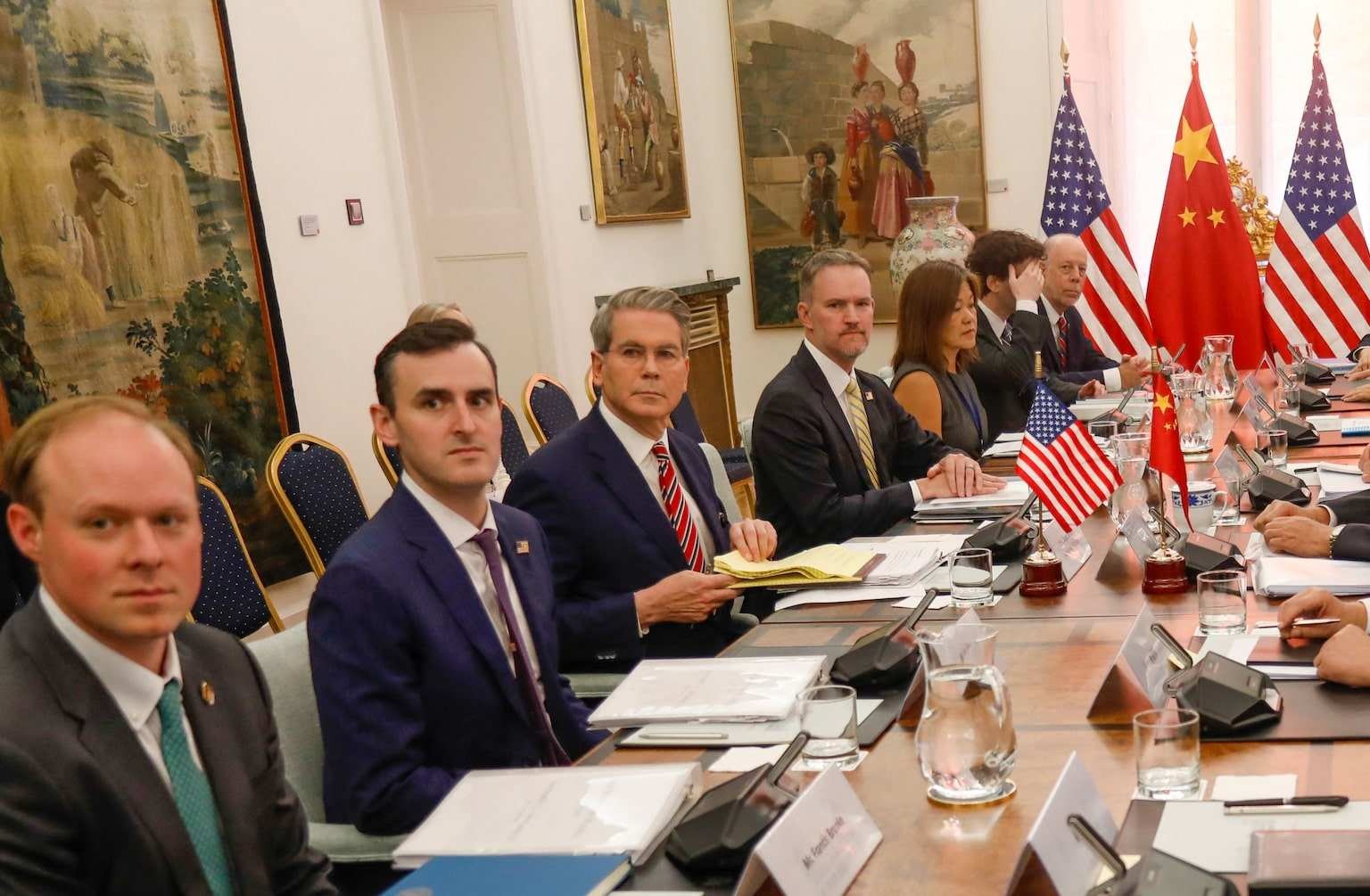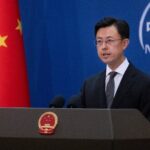Madrid, September 2025 – The United States and China are reportedly on the verge of resolving one of the most contentious issues in their ongoing trade negotiations: the future of the Chinese-owned video-sharing platform TikTok in the U.S. As high-level trade discussions continued into their second day at the Palacio de Santa Cruz in Madrid, Spain, U.S. Treasury Secretary Scott Bessent declared that the two economic superpowers are “very close” to finalizing a deal on TikTok’s operations.
Secretary Bessent’s comments injected a note of cautious optimism into the negotiations, which have been dominated by tensions over technology, market access, intellectual property rights, and national security concerns. Speaking to reporters on Monday morning, he remarked:
“I think that on the TikTok deal itself, we are either very close or we have resolved it, but there are a number of other asks that are still outstanding.”
While technical aspects of the agreement appear to have advanced significantly, broader negotiations are reportedly being hampered by China’s “very ambitious request,” according to Secretary Bessent.
The TikTok Dispute: A Flashpoint in U.S.-China Relations
The TikTok issue has become one of the most high-profile points of contention in the complex economic and strategic relationship between the U.S. and China. Owned by Chinese tech giant ByteDance, TikTok has faced growing scrutiny from U.S. authorities, who argue that the app poses national security risks by potentially allowing the Chinese government access to sensitive user data of millions of American users.
U.S. Position:
Over the past three years, U.S. lawmakers and federal agencies, including the Department of Commerce and the Committee on Foreign Investment in the United States (CFIUS), have raised concerns that TikTok could be used as a tool for surveillance or propaganda by Beijing. These concerns escalated under successive administrations, with multiple demands for stricter data protections, transparency measures, and in some cases, outright bans or forced divestment of TikTok’s U.S. operations.
China’s Position:
China, for its part, has consistently argued that TikTok operates independently of the Chinese government and abides by local regulations in every market where it operates. Chinese officials view the U.S. pressure on TikTok as part of a broader campaign to stifle Chinese tech companies and maintain technological dominance. They have resisted calls for structural changes that could amount to forced divestment or operational restrictions viewed as discriminatory.
Negotiations in Madrid: A High-Stakes Diplomatic Ballet
The Madrid talks represent the latest chapter in a series of trade negotiations between the two economic superpowers. In an atmosphere marked by high tension but also mutual economic interdependence, negotiators are seeking to reach a comprehensive agreement that addresses issues ranging from tariffs and intellectual property protections to market access and technology transfers.
TikTok at the Center of the Spotlight:
While the overall trade talks cover a broad range of topics, TikTok has emerged as the centerpiece of intense discussion. Both sides reportedly made significant technical progress on data protection measures, cybersecurity protocols, and governance structures for TikTok’s U.S. operations.
Key components of the emerging deal reportedly include:
- Data Segregation: U.S. user data would be stored domestically or in neutral third countries under strict oversight to prevent potential access by the Chinese government.
- Independent Governance: The appointment of an independent compliance board tasked with ensuring data privacy, transparency, and regulatory compliance.
- Audit Mechanisms: Regular audits by U.S. authorities or independent third parties to verify data security practices.
- Operational Transparency: ByteDance agreeing to enhanced transparency measures, including disclosures on content moderation algorithms and data-sharing practices.
Secretary Bessent refrained from confirming the exact details of the deal, stating only that technical negotiations had “moved forward significantly.”
Remaining Sticking Points: China’s Ambitious Requests
Despite optimism over progress on the TikTok file itself, Secretary Bessent acknowledged that broader negotiations remained challenging. He specifically referred to China’s “very ambitious request,” which many analysts interpret as Beijing’s insistence on reciprocal concessions in areas such as:
- Market access for Chinese firms in the U.S.
- Relaxation of U.S. export controls on critical technologies
- Protection of Chinese intellectual property rights
- Eased restrictions on data localization and cross-border data flows
Chinese negotiators are reportedly seeking a broader, more comprehensive deal that balances security concerns with economic openness, viewing the TikTok issue as a bargaining chip to achieve broader market reforms in the U.S.
Zhao Wei, China’s lead negotiator, told state media:
“We remain committed to achieving a fair and balanced agreement that respects the sovereignty and security of both nations while fostering sustainable economic cooperation.”
Global and Domestic Implications
U.S. Domestic Politics:
The TikTok debate has been deeply politicized in the United States, with bipartisan consensus framing the platform as a national security risk. Lawmakers across party lines have introduced bills threatening to ban TikTok or force its divestment. The Biden administration faces significant pressure to resolve the issue before upcoming elections, balancing tough rhetoric with the need to maintain constructive engagement with China.
Resolving the dispute could alleviate domestic political tensions, provide clarity to American consumers and businesses, and remove regulatory uncertainty hanging over the app’s future in the U.S. market.
China’s Strategic Calculus:
For Beijing, the stakes are equally high. Allowing a U.S.-China agreement to materialize on terms perceived as unfair could undermine China’s strategic goal of maintaining a dominant position in the global tech landscape. However, failure to reach a compromise risks further economic decoupling, escalating tariffs, and technology bans that could hurt Chinese tech firms’ global ambitions.
By positioning itself as reasonable and constructive in the negotiations, China may aim to portray the U.S. as the obstructionist party in global forums, such as the United Nations and the World Trade Organization.
Economic Analysts’ Take: A Balanced Outcome or Pyrrhic Victory?
Global market analysts are split in their assessment of the potential agreement’s long-term implications.
- Some experts view the pending deal as a pragmatic solution, enabling both nations to avoid the high costs of an outright ban or forced divestment that would disrupt the global digital economy and investor confidence.
- Others caution that any agreement may amount to a temporary fix, papering over deeper structural conflicts between the two countries. They warn that security concerns will continue to persist, and China may not fully comply with all governance or data protection provisions in practice.
James Montgomery, Senior Analyst at Global Tech Watch, commented:
“This is not just a business deal; it’s a geopolitical chess game. Both parties are maneuvering carefully, and while an agreement may emerge, real enforcement and long-term trust remain open questions.”
The Future of TikTok: What Happens Next?
If finalized, the TikTok agreement will represent a landmark development in U.S.-China economic relations, particularly in the digital and technology domain.
Potential implications include:
- Stability for Users: Hundreds of millions of TikTok users in the U.S. would be spared the uncertainty of a potential ban or forced shutdown.
- A Template for Future Deals: The governance mechanisms negotiated for TikTok could set a precedent for how other Chinese tech firms operate in Western markets.
- Investor Confidence: An agreement would likely stabilize ByteDance’s market valuation and reassure global investors wary of geopolitical risk in technology investments.
However, analysts emphasize that the real test lies in implementation. Independent oversight, regular audits, and compliance with data protection requirements will be essential for the deal’s credibility.
Global Reactions: Market and Industry Impacts
The global tech industry is closely monitoring the outcome of the talks. Tech giants such as Google, Meta, and Amazon have expressed indirect interest in the resolution of the TikTok case, viewing it as a bellwether for broader regulatory trends affecting foreign tech firms operating in sensitive markets.
Wall Street responded to the developments with cautious optimism. Shares of ByteDance and associated companies rebounded marginally after Secretary Bessent’s remarks, as markets priced in the likelihood of a negotiated outcome.
Meanwhile, digital rights advocates and consumer groups have called for greater transparency in the agreement. The Electronic Frontier Foundation (EFF) issued a statement urging both governments to ensure that user data privacy and freedom of expression remain protected under any deal.
Conclusion: A Turning Point in U.S.-China Tech Diplomacy
The ongoing U.S.-China negotiations in Madrid represent a pivotal moment in global technology and economic diplomacy. The near-finalization of the TikTok deal suggests that pragmatic compromise may still prevail over outright confrontation, offering a path forward in a highly volatile relationship.
Yet, as Secretary Bessent cautioned, several hurdles remain. The deal’s success will ultimately hinge not only on signing formal documents but on rigorous implementation, ongoing oversight, and mutual political will.
For now, millions of TikTok users in the U.S., policymakers on both sides, and global market participants are holding their breath, awaiting the final outcome of this high-stakes negotiation.
As the talks continue, one thing is certain: the TikTok dispute will remain one of the most closely watched diplomatic sagas of 2025, with ramifications that extend far beyond the realm of short-form videos.
Disclaimer: This article is for informational purposes only and does not constitute financial, legal, or investment advice.





